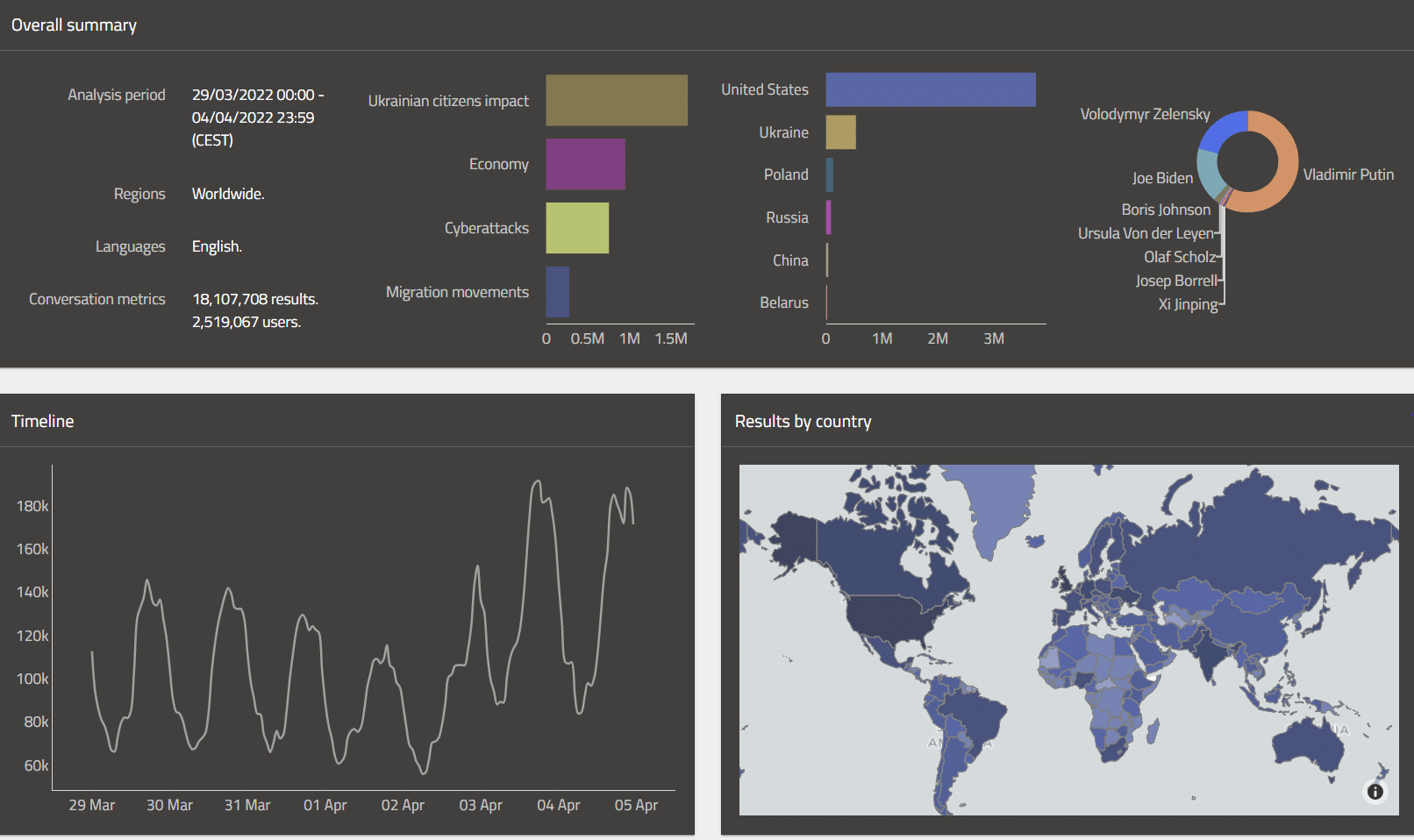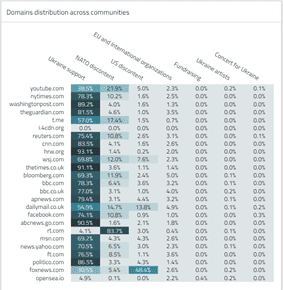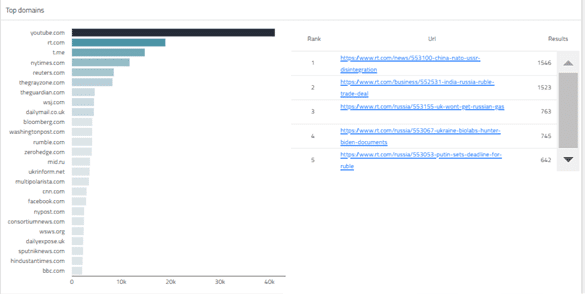Over the period analyzed, Constella’s dashboard captured 18,107,708 results generated by 2,519,067 users interacting in English.
To understand the narratives and key players driving the digital conversation, Constella’s team created a custom, proprietary dashboard visualizing selected dimensions of the digital public conversation pertaining to the Ukraine crisis. Our dashboard offers a tool identifying fast-moving global trends related to online conversation and the Ukraine crisis. Each week, Constella Intelligence will share notable findings from its dashboard on the Constella Intelligence blog. Below are key insights from March 29th to April 4th, 2022, from the digital public conversation related to Ukraine.
KEY INSIGHTS – MARCH 29TH TO APRIL 4TH, 2022
1. Russian accounts and media drive narratives critical of NATO and Western allies
Russian state media is the biggest contributor driving the conversation against NATO and Ukraine. Russia Today, and state propaganda outlets using Telegram rank as the 2nd and 3rd most frequently distributed domains. The Russian MFA has the most widely shared Telegram account, while the Russian Ministry of Defense ranks 3rd and RT ranks 4th. The fifth most relevant account during the period analyzed is the Ministry of Foreign Affairs of the Russian Federation (MFA) (@mfa_russia). These official Russian Federation Telegram accounts are used to comprehensively deny that the Russian military is responsible for killing civilians in Bucha. Sputnik (Russian state media), Thegrayzone.com (far-left website), Zerohedge.com (far-right libertarian website), and the official website of the Russian Exterior Relations Ministry are relevant domains in this community, sharing content and messages that deny the Bucha atrocities and shift blame on Ukrainian right-wing militias
2. High volumes of discussion around Ukrainian citizens and Zelensky emerge through conversations related to Bucha atrocities
The digital conversation related to Ukraine peaks between April 2nd and 4th, with #Bucha, #Buchamassacre, #Russianwarcrimes and associated hashtags standing out as key messages driving the conversation related to the impact of the war on Ukrainians. Mainstream western media is disseminated widely by largely Ukrainian accounts. The EU and International Organizations community also diffuses messages related to the alleged war crimes revealed at Bucha, focusing on the humanitarian tragedy. Zelensky’s prerecorded address to the audience at the Grammy’s on the 4th of April also contributed to the peak in conversations discussing Zelensky and his appeals for support to western allies.
3. US- and NATO-critical communities spread conspiracy and disinformation about current events The previous week’s community critical of the US and NATO separated into two distinct blocks where voices sometimes share conspiratorial messages and fringe beliefs. A resurgence of allegations related to Hunter Biden are driven by American conservative profiles and conspiracy theorists pushing unsubstantiated claims of the Bidens receiving $3.5 million from Putin and Russia. Users resurface these claims, alleging corruption that targets Hunter Biden, the Biden family, and the Biden administration. Amidst these claims, Biden and his administration are blamed for energy-related domestic issues, among other social and political problems. Republican party members such as Marsha Blackburn (@MarshaBlackburn), while not supportive of Vladimir Putin or the Russian military, lead criticisms that high gas prices are the fault of the Biden administration. Those voices within the NATO-critical community discuss diverse topics, many of them focusing on criticisms of western nations and institutions in addition to criticisms of NATO in provoking the current conflict. Inclusion within this community does not indicate that a particular voice is pro-Russia or opposed wholeheartedly to the EU/USA but is an indicator within the cadence of conversation related to a generalized topic. Notably, pro-Russian narratives claiming that the Bucha massacre has been manipulated or fabricated by western media are shared. In both communities, unproven claims of Zelensky’s supposedly enormous wealth are shared in a conspiratorial tone.
COMMUNITIES – MARCH 29TH TO APRIL 4TH, 2022
1. Ukraine Support (51.9% of users): Messages of support for Ukraine and Zelensky and condemnation of the attacks and atrocities discovered in the city of Bucha.
2. NATO Discontent (15.6% of users): Led by pro-Russia profiles such as the Ministry of Foreign Affairs of the Russian Federation (@mfa_russia), RT (@RT_com). Diverse themes are discussed, including questioning NATO for its campaign to discredit Russia and recalling NATO’s role in the 2011 military intervention in Libya that killed Muamar Gadafi. Zelensky is also criticized with unsubstantiated claims of being wealthier than Hollywood stars, such as Will Smith.
3. US Discontent (6.0% of users): US republicans and conspiracy theorists critical of the US government. Users share allegations that Biden’s son made deals with Putin in the past and deny gas prices and other US domestic issues are Putin’s fault, instead shifting blame towards the Biden administration. Notable conservative and alt-media like Fox News, NY Post, Breitbart, and Zero Hedge are among the most shared media domains in this community.
4. EU and International Organizations (4.2% of users): Led by EU profiles (@EP_President, @EU_Commission, and @JosepBorrellF), multilaterals and human rights organizations like Human Rights Watch, the UN, the UNHCR, and UNICEF. Messages of support and solidarity with the Ukranian government are spread, lauding their defense of democracy and Liberty. The Bucha massacre is also condemned.
5. Fundraising (1.6% of users): Crypto-related accounts sharing campaigns linking the conflict to fundraisers and money-raising initiatives.
6. Ukraine Artists (0.6% of users): Ukranian artists use their work to bring visibility to the plight of women in the conflict, condemn Russian aggression, and criticize platforms like Artstation for censoring the work of Ukrainian artists.
7. Concert for Ukraine (0.5% of users): Conversations related to a concert in Resorts World Arena with artists like Ed Sheeran and Camila Cabello in support of Ukraine.
APPENDIX – MARCH 29TH TO APRIL 4TH, 2022
In the first iteration of this dashboard, we captured results related to the following 3 dimensions: Countries, Key Figures, Themes
- Selected countries currently in the dashboard include: The United States, Ukraine, Russia, China, Poland, Belarus.
- Selected Key Figures currently in the dashboard include: Vladimir Putin, Volodymyr Zelensky, Joe Biden, Boris Johnson, Ursula Von der Leyen, Josep Borrell, Xi Jinping, Olaf Scholz. Any mentions to these key figures are captured in the dashboard and can be visualized across multiple dimensions of analysis.
- Selected themes currently in the dashboard include: Ukraine Citizens Impact, Economy, Cyberattacks, Migration Movements
Top Domains in the NATO Discontent Community
Interested in seeing our Ukraine dashboard in action? Request a demo with one of our geopolitical intelligence experts.
Read previous week’s findings:








